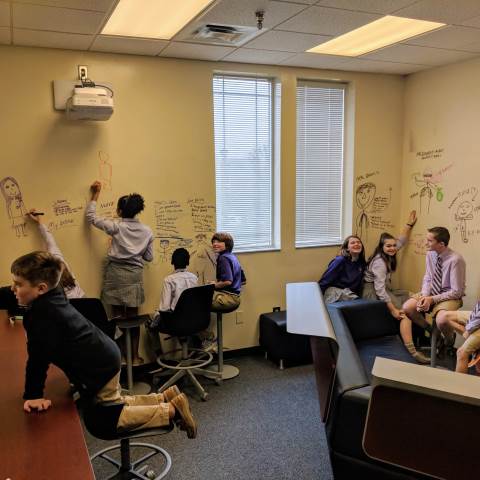We fear what we don’t know; it’s almost human nature. What we do with that fear however, is something all together different. When I teach "The Giver" to sixth-graders and "Lord of the Flies" to seventh, a common theme threads through both of these novels; fear of the unknown. It’s even a common theme we see threading through our own daily lives. Similarly, a question I often hear, and I know I asked myself as a student, was why? Why do I need to learn this? Why does it matter? Why am I sitting here when I could be watching "Saved by the Bell"?
Instead of fearing the unknown and questioning ‘why,’ why not look to the future, the biggest unknown, and learn how to critically think through, find, and solve problems we may ultimately face? Real problems. Real situations. Real life-learning. Real reasons to answer why.
Future Problem Solvers (FPS) is a program I participated in while in grades 5-7. It is a competitive and academic program that stimulates critical and creative thinking skills, encourages students to develop a vision for the future, and prepares them for leadership roles. The focus of FPS is on the Creative Problem Solving (CPS) process on teaching students how to think, not what to think. Students learn to brainstorm together and divide up written work so that each team member contributes to the final product. Ultimately, FPS teams can compete at state and international levels. I may have won a couple of those competitions…
Now, what does all that mean? And why do you care?
With the approval of my administration, I am teaching a “mock” 10-week unit of FPS to my entire sixth grade class. So far, they have been broken into their 3-4 man teams and have already practiced their first FPS booklet writing. When the real “competition” day comes, they will be assigned a room to themselves, left to their own devices, to complete the six-step booklet process. They are their own time-keepers, their own organizers, their own focus police, their own future problem solvers.
So far, the sixth-graders have already identified the harmful repercussions of being an “ultra” social media user and have started solving problems by creating the N.C. (Nanobot Committee), Government issued MonoBots, artificial laser technology issued by the Psychological Health Institution (PHI), the Unknown Zone Bad Idea Stopper (U.Z.B.I.S), and the Pranking Prevention Agency.
Solution Example, written by Darlington sixth-graders: “The future President of 2055 will start T.E.D. (Teen Exercise Department), to handle time offline and online. He will do this by making devices that only work for five hours a day. It will tell you when to exercise. If you don’t exercise, you will not be able to use your device as long the next day. If you do exercise, you will get points, which are used to buy toys. This will help teens get healthy.”
The next FPS topic will be ‘Identity Theft’. Students will have 5-7 days to research the topic, continue brainstorming exercises, and grow as a team. On February 7 they had their first competition day, alone; no adults to tell them to stay on task, keep time, or answer questions. What’s to fear about that future?

